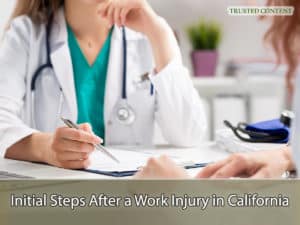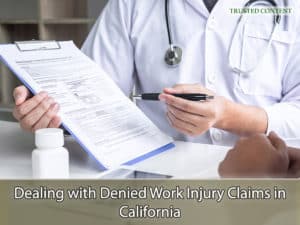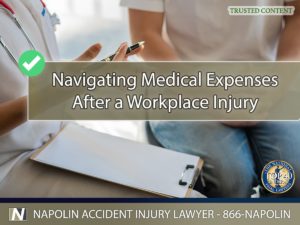Navigating Medical Expenses After a Workplace Injury in California
In the aftermath of a workplace injury, employees often find themselves facing not just physical recovery but also the daunting prospect of navigating through medical bills and workers' compensation claims. In California, the process for handling these expenses is structured yet complex, requiring a deep understanding of legal rights and procedures. This comprehensive guide aims to demystify the process, offering crucial insights into managing medical expenses effectively. It serves as a beacon for injured workers in Southern California, illuminating the path to financial and physical recovery by explaining the intricacies of workers' compensation law and the rights of injured workers.
Understanding Workers' Compensation in California
Workers' compensation in California is designed to provide relief and support to employees who suffer from work-related injuries or illnesses. This no-fault system ensures that workers are compensated for medical costs and lost wages without the need to prove their employer's negligence. However, navigating this system can be complex, involving strict filing deadlines, specific medical provider networks, and potential disputes over the extent of injury coverage. Understanding the scope of benefits, including medical care, temporary disability benefits, and potential settlements for permanent disabilities, is fundamental. Additionally, workers should be aware of their rights to select and change their treating physician within the network after a certain period.

Initial Steps After a Work Injury in California
Initial Steps After a Work Injury in California
The immediate response to a workplace injury plays a pivotal role in the success of a workers' compensation claim. First and foremost, seek medical attention to address your injuries. Informing your employer about the incident as soon as possible is equally important, as California law requires that the injury be reported within 30 days. Early reporting not only facilitates the start of your medical treatment but also strengthens your claim. Documenting the injury, the circumstances under which it occurred, and any witness accounts can further substantiate your claim. This initial phase is crucial for setting the foundation of your workers' compensation process.
How Medical Bills Are Covered for a California Work Injury
In California, workers' compensation covers all medical expenses related to your work injury, including hospital visits, physical therapy, medication, and any necessary medical equipment without out-of-pocket costs to the injured worker. The law mandates that the coverage includes not just immediate treatment but also long-term care for the injury sustained. However, it is vital to ensure that the medical providers are authorized under your employer’s workers' compensation insurance network to avoid disputes over coverage. Navigating through the Medical Provider Network (MPN) and understanding the pre-authorization process for specific treatments or diagnostic tests are critical steps in ensuring your medical bills are covered seamlessly.
Navigating the Claims Process
The workers' compensation claims process in California starts with notifying your employer and filing a DWC-1 claim form. Upon receipt, your employer must forward this form to their insurance carrier, initiating the claim. It's crucial to provide detailed information about your injury and the circumstances, as this will form the basis of your claim. Throughout the process, maintaining open communication with your employer and their insurance company is key to resolving any issues that arise. It’s also essential to keep copies of all documents related to your claim, including medical records and correspondence. Understanding the timeline for claim resolution and the steps you can take if your claim is delayed, such as requesting an expedited hearing, is vital for a smooth process.

Dealing with Denied Work Injury Claims in California
Dealing with Denied Work Injury Claims in California
Facing a denied workers' compensation claim or disputes over the coverage can be distressing. In California, workers have the right to challenge these decisions through the Workers' Compensation Appeals Board (WCAB). The first step in this process involves filing a Declaration of Readiness to Proceed, which moves the dispute to a hearing before a judge. Preparing for this hearing requires gathering substantial evidence, including medical records and expert testimonies, to support your claim. Additionally, understanding the common grounds for claim denial, such as disputes over the injury being work-related or adequate documentation, can help you navigate through the appeal process more effectively. Legal representation can be invaluable at this stage, providing the expertise needed to argue your case successfully.
Third-Party Liability in Work Injuries
In certain cases, a worker's injury may be attributable not only to their employer but also to a negligent third party. This could include manufacturers of faulty equipment, drivers in work-related car accidents, or subcontractors on a job site. In such instances, California law allows injured workers to pursue a third-party liability claim in civil court alongside their workers' compensation claim. These dual claims can potentially increase the compensation available, covering not just medical bills and lost wages but also pain and suffering, which is not compensated under workers' compensation. Navigating both claims concurrently requires a strategic approach and a clear understanding of how they interact and impact each other.

Navigating Medical Expenses After a Workplace Injury in California
Navigating Medical Expenses After a Workplace Injury in California
Managing medical expenses and navigating the complexities of workers' compensation claims in California can be overwhelming for injured workers. Armed with the right information and guidance, however, it is possible to traverse this challenging path successfully. If you're struggling with a work injury and the subsequent financial burdens, seeking professional legal help can make a significant difference. At Napolin Accident Injury Lawyer, we're committed to supporting injured workers throughout Southern California, ensuring they receive the compensation and medical attention they deserve. For comprehensive support and expert guidance, call us at (866)-NAPOLIN for a free consultation today. Together, we can tackle the challenges of workers' compensation, helping you focus on what truly matters – your recovery and well-being.
- A Guide on Red Light Auto Accidents in California - August 14, 2024
- Self-Representing in a California Personal Injury Claim - August 13, 2024
- Common Sources of Distraction for Drivers in California - August 13, 2024
